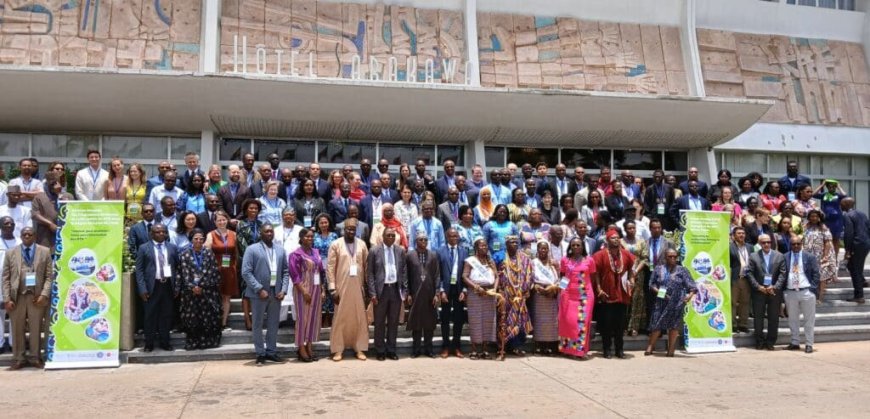WHO is working closely with Member States and partners to adapt public health strategies, enhance surveillance, and ensure timely responses to evolving NTDs challenges
African health experts have renewed commitment to accelerate efforts to end Neglected Tropical Diseases (NTDs) that continue to affect over a billion people globally, 40% of whom live in the African region.
Meeting in Togo from 15 to 17 April 2025 for the NTD Programme Managers meeting, the experts also set in motion discussions and collaborations aimed at driving bold and more strategic approaches to end NTDs in Africa.
The African region is home to twenty of the 21 recognized NTDs, including river blindness, lymphatic filariasis, leprosy, and several skin diseases that disproportionately affect the poorest and most marginalized communities. These diseases can cause severe disabilities, social stigma, and even death. Despite progress in recent years, all 47 countries in the WHO African Region remain endemic for at least one NTD, and 37 are battling five or more concurrently.
“We must step up our efforts while ensuring that no one is left behind,” said Dr Chikwe Ihekweazu, Acting WHO Regional Director for Africa. “As we reach the mid-point of the 2021–2030 NTD Roadmap, it’s not just a moment of reflection—it’s a call to action.”
The three-day hybrid meeting brought together over 45 national programme managers and various stakeholders, including global health partners and civil society organizations. The health leaders committed to enhance country leadership and increase domestic financing for NTD programmes to ensure long-term sustainability, accelerate the adoption of innovative diagnostic tools, digital technologies, and treatment methods to improve disease prevention, detection and patient care, strengthen national and community-based surveillance systems to track disease outbreaks and monitor progress more effectively and develop concrete national action plans to address persistent gaps in access to prevention and treatment services, particularly in underserved populations.
The meeting, organized with support from the Kuwait Fund and other partners, was an opportunity for participants to reflect on key milestones, identify challenges, and shape effective strategies for NTD elimination. Representing the Minister of Health and Public Hygiene of Togo, Dr Wotobe Kokou commended the country’s leadership in eliminating four NTDs—Guinea Worm, Lymphatic Filariasis, Human African Trypanosomiasis, and Trachoma—making Togo the first in the region to achieve this milestone.
“These successes are the result of strong political commitment, close collaboration with our partners, and exemplary community engagement. They demonstrate that with concerted efforts and innovative strategies, eliminating neglected tropical diseases is possible,” he said.
Dr Amadou Bailo Diallo, WHO Representative in Togo, also lauded Togo’s achievements and reaffirmed the importance of multisectoral and community-centered approaches in fighting NTDs.
“With funding cuts and climate change posing emerging threats to global health programmes, including NTD elimination efforts, addressing NTDs requires not just innovative strategies, but targeted support that focuses on the most vulnerable communities.” Dr Dorothy Achu, Team Lead for Tropical Vector-Borne Diseases at WHO Regional Office for Africa. “We must ensure diseases disproportionately affecting the poorest and most marginalized populations receive needed attention and resources, particularly those that can be eliminated. With sustained efforts, we can end the burden of NTDs on Africa’s communities”.
WHO is working closely with Member States and partners to adapt public health strategies, enhance surveillance, and ensure timely responses to evolving NTDs challenges. By convening NTD stakeholders, disseminating guidelines, strengthening governance, and providing technical support in strategic and operational planning, policy development, capacity building, and strengthening surveillance, monitoring, and evaluation systems, the Programme Managers’ meeting is a WHO initiative aimed at supporting country leadership and governance, with ongoing support from the Regional Programme Advisory Group
The 2025 NTD Programme Managers’ Meeting reinforces the commitment of the WHO AFRO and its partners to eliminate NTDs and improve the health and well-being of communities across the African Region. The meeting significantly contributes to aligning national and regional efforts with the global roadmap for NTD elimination and achieving Sustainable Development Goals (SDGs). With renewed momentum, African countries are signalling a united front to bring an end to these preventable and treatable diseases.







OTHER ARTICLES
Editorial — Prevent, inform, and act for women’s health in Africa
Kenya : Government Prioritises Maternal Health and Strengthens Support for Community Health Promoters
Strengthening pandemic prevention, preparedness, and response capacities in Senegal using the “One Health” approach